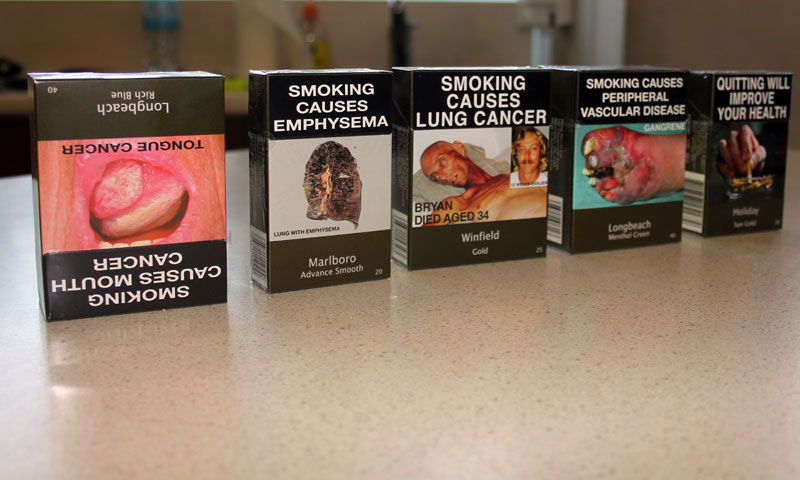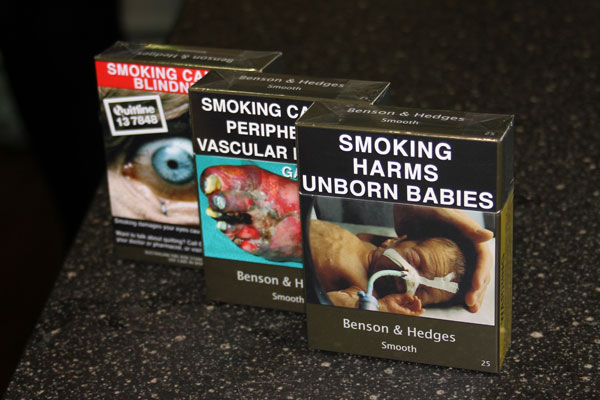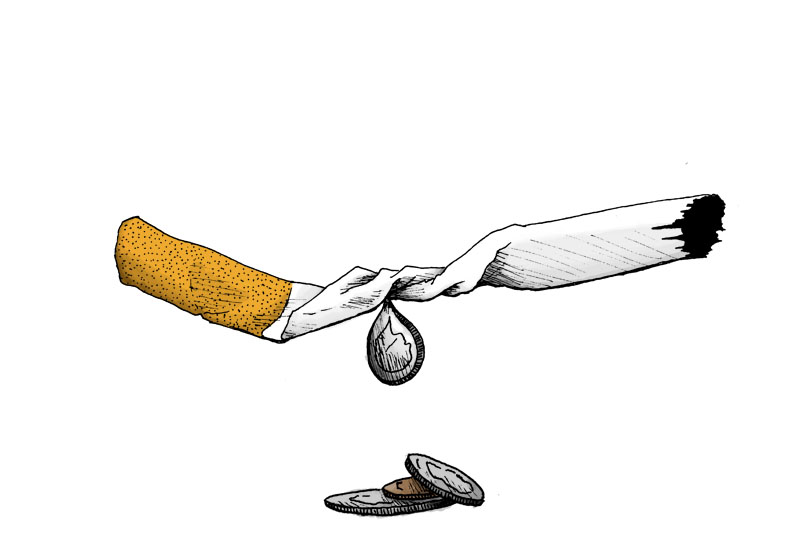An appeal is expected to be made by one or more of the complainants that referred Australia to the World Trade Organization (WTO) over the country’s introduction of plain tobacco packaging, according to Professor Tania Voon of the Melbourne Law School, University of Melbourne.
It has been widely reported, including here, that the WTO recently ruled in favor of Australia.
In a lengthy piece on the Intellectual Property Watch website, Voon said that scholars and professionals in intellectual property, trade and public health were likely to be digesting the 900-odd page WTO Panel Reports in Australia – Tobacco Plain Packaging, circulated on June 28, for some time.
‘An appeal by one or more of the complainants (Cuba, the Dominican Republic, Honduras and Indonesia) is expected, to be launched between 20 and 60 days after circulation, in accordance with the WTO’s Dispute Settlement Understanding (DSU, Art 16),’ she said.
‘Although Australia won the dispute in its entirety, the country could also choose to appeal certain intermediate findings of the Panel, such as its interpretation or application of particular WTO provisions.’
Voon went on to say that, in theory, an appeal would take an additional 90 days, but that the duration of appeals had been significantly higher in recent years, especially in more complex cases. And Australia – Tobacco Plain Packaging was a highly complex case, involving record numbers of third parties (e.g. 38 in the complaint brought by Honduras) and voluminous evidence presented on both sides (e.g. as summarised in the 150-page Appendices to the Panel Report).
Voon’s piece goes on to give details of the Panel’s decisions and the reasons behind those decisions.
Category: Litigation

WTO appeal likely

Plain-packs defense costly
The Australian Government spent nearly $39 million over six years defending its standardized-tobacco-packaging laws against Philip Morris Asia (PMA), according to a story in The Guardian quoting freedom of information documents.
The documents indicate the figure, $38,984,942.97, is the total amount invoiced to the Department of Health by ‘external service providers’, related to the bilateral-investment treaty dispute between Australia and PMA for the financial year 2011-12 through to October 2016.
The department was quoted as saying that some of that amount might not relate solely to the PMA dispute, because some service providers had worked on that dispute and other standardized-tobacco-packaging litigation matters, and invoices for their work had not been disaggregated.
However, that figure had been provided as the ‘grand total’ amount after a two-year freedom of information battle by former senator Nick Xenophon and his former staffer, now Centre Alliance senator, Rex Patrick.
Patrick was quoted as saying that he had been blown away by the “mammoth cost” to taxpayers of the legal fight.
“This is exactly why Australia must stop signing up to free trade agreements with these insidious ISDS [Investor-State Dispute Settlement] provisions in them,” he said.
“I accept the government had to defend the matter, but if we hadn’t signed up to the Hong Kong agreement with ISDS provisions in it then there would not have been a tribunal hearing. Imagine what health outcomes could have been achieved with that $39 million.”
The Guardian story said that Philip Morris had taken its case to the permanent court of arbitration in 2012, using an ISDS clause in a 1993 Hong Kong-Australia trade deal.
The Guardian story looks also at ISDS issues related to the 11-country (including Australia) Trans-Pacific Partnership.
Smokers off the rails
A Beijing court has ordered a railway authority to eliminate smoking areas on trains to provide a ‘better traveling environment for passengers’, according to a story in The China Daily.
The court said also that ashtrays should be removed.
The Beijing Railway Transport Court gave the order to the Harbin Railway Bureau in a ruling that said the removal of smoking-related facilities and zones would protect the public interest.
‘People’s rights sometimes come into conflict in a closed space, such as trains,’ the verdict said. ‘Passengers’ rights to stay healthy in coaches, we believe, is more important than the rights of smokers.’
Sun Weihong, the railway bureau’s attorney, said after the announcement that the bureau hadn’t decided whether to appeal against the decision.
Jiang Yuan, deputy director of the Chinese Association on Tobacco Control, applauded the ruling, describing it as the beginning of the end of smoking on ‘ordinary trains’.
In China, smoking is prohibited on high-speed trains, but not on ordinary trains.
“The case can be considered the country’s first lawsuit in which an ordinary train was ordered to prohibit smoking,” Jiang said.
The decision, Jiang added, would help contribute to smoking control in other public places.
Packs finding welcomed
US-based Action on Smoking and Health (ASH) has welcomed Thursday’s decision by the World Trade Organization (WTO) in favor of Australia’s regulations on standardized tobacco-product packaging.
‘The tobacco industry has long used litigation as a weapon against meaningful public health measures,’ ASH said. ‘Australia deserves credit for standing up to the barrage of lawsuits that followed its implementation of plain packaging, including a domestic constitutional challenge, a direct trade challenge under an investment agreement, and the WTO challenge launched by four countries on behalf of the industry (Ukraine, the original litigant, eventually dropped its challenge).’
ASH said that the WTO decision had not come as a surprise for the tobacco industry. ‘Their litigation strategy is not focused on winning but on imposing economic penalties on countries that try to push the envelope on tobacco control, in the hopes that other governments will shy away, a strategy often called “regulatory chill”,’ it said. ‘Unfortunately, the tactic is all too often successful. Several countries delayed or ended plain packaging efforts as a result of the Australia case.’
ASH went on to say that there existed an irreconcilable conflict of interest between industry profits and public health.
‘In addition to prioritizing health over profits, this WTO decision demonstrates the rights of governments to legislate in the public interest,’ it said. ‘International trade law has long been skewed in favor of corporate rights. Today the WTO panel demonstrated its understanding that governments have a duty to their citizens, not foreign investors.’
ASH said that Australia should not have had to litigate these trade cases. ‘Corporate litigation rights are included in many trade agreements as a backstop for cases where domestic rule of law is weak,’ it said. ‘This is certainly not true for Australia, where Big Tobacco’s case was heard fairly.
‘Action on Smoking and Health will continue to work diligently for exclusions in trade agreements that protect tobacco control regulations from challenges, as we did in the draft Trans-Pacific Partnership Agreement.’
No, no; it's easy to quit
Major tobacco manufacturers in the US have from yesterday been compelled to include on their websites so-called corrective statements.
Altria, Philip Morris USA, R.J. Reynolds Tobacco and Lorillard have been ordered by a federal court to make the statements.
The statements cover the health effects of smoking; the addictiveness of smoking and nicotine; low-tar and light cigarettes; the design of cigarettes; and the health effects of second-hand smoke.
According to a CNBC story relayed by the TMA, the statements were ordered on May 1 as part of a 2006 federal court decision that found the major cigarette manufacturers had defrauded the public about the health risks of their products.
CNBC said that the statements must be included also with cigarette packs as ‘onserts’ by November 21, running for 12 weeks over two years.
Jailed for smoking shisha
Six people have been sentenced to four months in prison by a court in Mombasa, Kenya, after they pleaded guilty to smoking shisha, according to a story in The Star.
The six were among 10 people charged with smoking shisha in a restaurant in the Sparki area of Mombasa county.
The other four, who denied the charges, were each released on a Sh50,000 bond.
Police officers were said to have raided the restaurant after a tip-off.
The former Health Cabinet Secretary Cleopas Mailu in December banned importing and smoking shisha, on the grounds that smoking shisha was a health hazard.
Earlier this year, justice Roseline Aburili declined to lift the ban pending the hearing and determination of a legal challenge to the ban.
The judge said even though the applicants had an arguable case, this didn’t mean their case would be successful.
She said lifting the ban would be a wrong move and not in the interests of the public.
The judge was of the view that should the court rule in favor of the applicants after the full hearing, it would not be impossible to revert to the initial status.
Appeal package
Ujal Singh Bhatia, chairman of the World Trade Organization’s appellate body, has said he expects Cuba, the Dominican Republic, Honduras and Indonesia to appeal against the WTO’s yet-to-be-publicized ruling on Australia’s law on standardized tobacco packaging, according to a Bloomberg story relayed by the TMA.
The ruling will apparently say that the law was a legitimate public health measure and did not constitute an illegal barrier to trade.
Bhatia said once an appeal was triggered, the WTO appellate body was required to consider the matter and issue a ruling within 90 days.
However, he added that the timeline might be extended because of the complexity of the dispute and a shortage of panelists in the WTO’s appellate system.
The countries alleged that the measure imposed ‘unfair’ restrictions on the use of trademarks, geographical indications and other markings in violation of several WTO agreements.
The WTO has yet to circulate publicly its final dispute ruling, partly because of the time required to translate the ruling.
Corrective statements online
The US’ major cigarette companies will have to post court-ordered ‘corrective statements’ on their websites from next month.
A note posted on the Website of the US Department of Justice said that on Tuesday the District Court for the District of Columbia had entered a consent order requiring the country’s major cigarette companies to begin posting ‘corrective statements’ on their websites starting on June 18.
‘The order, part of a long-running lawsuit against the cigarette companies, also requires them to attach the same statements to cigarette packages for two weeks at a time, for a total of twelve weeks over two years,’ the note said. ‘The order will also apply to any social media campaigns by the companies to promote cigarettes.
‘The statements address the effects of cigarette smoking and the fact that cigarettes are deliberately designed to create and sustain addiction. As a result of a previous court order, the statements are currently running on television five times per week, and previously ran as full-page ads in about fifty newspapers across the country.
‘The statements specifically state, among other things:- ‘That smoking cigarettes causes numerous diseases and on average 1,200 American deaths every day;
- ‘That the nicotine in cigarettes is highly addictive and that cigarettes have been designed to create and sustain addiction;
- ‘That so-called light, low-tar, and natural cigarettes are just as harmful as regular cigarettes; and
- ‘That second-hand smoke causes disease and death in people who do not smoke.
‘The corrective statements were ordered as part of a 2006 permanent injunction against cigarette companies, including Altria, its Philip Morris USA subsidiary, and R.J. Reynolds Tobacco, to “prevent and restrain” further deception of the American people regarding tobacco use. The order also applies to ITG Brands, which purchased Winston, Kool, and other cigarettes brands from companies in the case.’

Regulations challenged
Two cigarette manufacturing firms have asked Kenya’s Supreme Court to throw out the country’s Tobacco Control Regulations of 2014, arguing that they were introduced arbitrarily, according to a story in The Nation.
British American Tobacco and Mastermind Tobacco Kenya reportedly told five Supreme Court judges in Nairobi that the regulations, enacted to regulate the production and consumption of tobacco and its products, were developed to restrict their commercial interests.
BAT filed the case to challenge the Court of Appeal’s dismissal of its plea against High Court Judge Mumbi Ngugi’s decision to disallow its petition challenging the regulations.
Through its lawyers, BAT argued that the regulations were created without proper public participation and stakeholder consultations.
The company asked the Supreme Court to rule that the ‘failure to conduct proper consultations rendered the entire regulations unconstitutional’.
BAT said it was aggrieved with the provisions limiting interactions between public officials and the tobacco industry, which it termed as discriminatory and a violation of its constitutional rights.
Lawyers for the company asked the Supreme Court judges to find also unconstitutional regulations that required it and other tobacco product manufactures to contribute two percent of their revenues to a consolidated fund.
They said the levy was a form of forceful taxation imposed on their client and other cigarette and tobacco product manufacturers, and that it was derived from draconian Scottish, Roman and Dutch laws, and not English common laws.
The regulations extended non-smoking zones to outdoor areas adjacent to public places, including streets, verandas and any others defined by the Health Cabinet Secretary.
The rules, the lawyers added, violated constitutional rights to privacy, and intellectual property rights by requiring companies to reveal the contents of their products and their revenue.
But Senior State Counsel Mohamed Adow opposed the appeal, saying the firms were protecting their commercial interests without regard to public safety and the health of millions of Kenyans.
The judges have yet to indicate the date on which they will make their ruling public.
New taxes opposed
A coalition of business organizations, the Business Renaissance Group (BRG), has called on Nigeria’s government to review recently-announced increases in excise duties on locally produced tobacco products, and wines and spirits, according to a story in The Vanguard.
The federal government announced on March 11 that the duty increases would be spread over the next three years, with the first going into effect on June 4.
The BRG is said to have demanded that the federal government revert to the previous taxes or come up with a compromise based on input from ‘critical stakeholders’.
A new approach was needed that would impact positively on the government, the industry and the general population, and ultimately provide further growth and development for the country.
Briefing journalist in Abuja, the chairman of the BRG, Mazi Omeife Omeife, said increasing excise duties was counterproductive in respect of the government’s job-creation policy. Such increases were going to lead to job losses and the further impoverishment of ordinary Nigerians.
The BRG has said that it will seek judicial redress if the government does not respond within 30 days.









